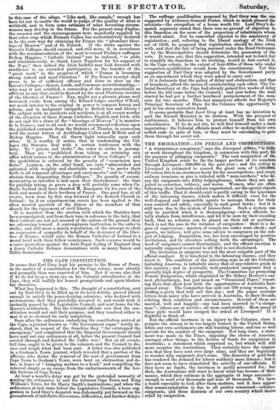THE EMIGRATION—ITS PERILS AND OBSTRUCTIONS. " A WrDESPREAD conspiracy," says
the Liverpool Albion, "is fully at work throughout the kingdom, in connexion with this port, for thepurpose of pillaging emigrants." The vast emigration of the United Kingdom sends by far the larger portion of its numbers through Liverpool--200,000 in the past year ; and the outlay in Liverpool is estimated to exceed the great sum of 1,500,0001. Of course this is an enormous booty for the unscrupulous; and every railway terminus or pier is infested with " man-catchers," who de- coy the emigrants into filthy lodginghouse.s, where they are sub- jected to extortion, robbery, and worse. Women, who are often following their husbands and are unprotected, are the special objects of this traffic. That it should exist is partly owing to the ignorance of the labouring classes, which makes it difficult even for the well-disposed and responsible agents to manage them for their own comfort and safety, especially in such great herds ; but it is still more due to the system of laissez-faire. Such a system can only be justified when it is thoroughgoing—when officials to- tally abstain from interference, and let it be seen by their standing back, that no reliance can be placed on their aid or guidance. Such is nut the case in the instance of emigration : there is a de- gree of supervision ; masters of vessels are under some cheek; and agents, we believe, will give some advice to emigrants on the sub- ject of lodging. Emigration, too, has been encouraged by positive invitations, and by circulars setting forth the advantages. The herd of emigrants cannot discriminate, and the official sanction is naturally supposed to extend to all that is not disclaimed. The invitation to emigrate was not the most culpable part of the official conduct. It is beneficial to the labouring classes, and they know it. The condition of the labouring man in all the Colonies, including America, is infinitely above that of any relative grade in this country ; and in Australia well-conducted emigrants find a specially high degree of prosperity. The Committee for promoting Female Emigration, which originated in Mr. Sidney Herbert's ear- nest philanthropy, has just issued an "Occasional Paper," report- ing facts that show how little the opportunities of Australia have passed away. The Committee has sent out 700 young women, in- cluding a party that will sail this day ; and the paper contains letters from many who have arrived in Australia, to their friends, relating their condition and circumstances. Several of them are married, well and happily—one had been married to "a clergy- man"; others are at service ; all seem comfortable. How many of these girls would have escaped the ordeal at Liverpool? It is frightful to think of. But the official inertness is an injury to the Colonies, since it permits the stream to be too largely turned to the United States, while our own settlements are still wanting labour, and can so well provide for the comfort of the emigrant. Not long since, a state- ment was made in the Times, imputing the choice of America, amongst other things, to the decline of funds for emigration to Australia ; a statement which surprised us, but which will still more surprise the Australians. They certainly have the impres- sion that they have sent over large sums, and they are beginning to wonder why emigrants don't come. The discovery of gold-beds has rendered the demand for labour suddenly more intense ; but it does not seem to have stimulated the activity of our officials. If they have no funds, the inertness is partly accounted for ; but then, the Australians will want to know what has become of their money, which they estimate in the aggregate at large amounts— enough to send over thousands and tens of thousands. We have a board especially to look after these matters, and it does appear that some.explanation is due to all parties concerned—colonies. emigrants, and those districts of our own country which desire relief by emigration.


























 Previous page
Previous page